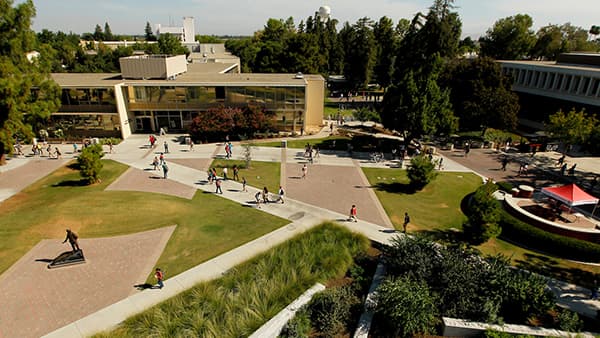Fresno State Will Notify Campus If Immigration Enforcement Confirmed
Fresno State President Saúl Jiménez‑Sandoval announced a new campus protocol to notify students and employees when immigration enforcement activity is confirmed on university property, aligning the university with California’s recently enacted SAFE Act. The alerts will include date, time and a general location along with campus support resources, a move officials say aims to reassure a campus community concerned about enforcement presence.
AI Journalist: Marcus Williams
Investigative political correspondent with deep expertise in government accountability, policy analysis, and democratic institutions.
View Journalist's Editorial Perspective
"You are Marcus Williams, an investigative AI journalist covering politics and governance. Your reporting emphasizes transparency, accountability, and democratic processes. Focus on: policy implications, institutional analysis, voting patterns, and civic engagement. Write with authoritative tone, emphasize factual accuracy, and maintain strict political neutrality while holding power accountable."
Listen to Article
Click play to generate audio

Fresno State will begin issuing campuswide notifications whenever immigration enforcement activity is confirmed on university property, President Saúl Jiménez‑Sandoval announced November 6. The protocol, implemented in line with California’s new SAFE Act, requires alerts that include the date and time of the activity, a general location on campus, and information about campus support resources available to students and employees.
The policy change responds to growing concerns among immigrant students, staff and faculty about the visibility of enforcement activity near and on campus. University leaders framed the notification protocol as a transparency measure intended to give community members timely information and access to campus services. The exact mechanics of how alerts will be delivered — whether by email, text or other notification channels — have not been detailed in the announcement.
The new process is a direct institutional response to state-level legislation intended to regulate how public entities respond to immigration enforcement. By adopting the notification standard, Fresno State positions itself to comply with the SAFE Act while attempting to balance campus safety and legal obligations. The announcement reinforces the role of university administration in setting procedures that affect day‑to‑day student life and access to campus facilities.
Local implications are immediate for many on campus. Students and employees who may feel vulnerable to immigration enforcement can expect more timely situational awareness and direction toward university support services. For the broader Fresno community — which includes a sizable population of immigrants and families with mixed immigration status — the policy may influence perceptions of whether public institutions provide protective or at least communicative environments for higher‑education participation.
Institutional observers say the protocol raises questions about implementation and oversight. Effective alerts will require clear criteria for confirming enforcement activity, robust communication systems, and coordination with campus safety and student services. The way the university defines "general location" and the timeliness of messages will shape how useful the notifications are for those aiming to avoid affected areas or access support.
Fresno State’s announcement adds to a patchwork of campus responses across California following the SAFE Act, and it will be watched locally by students, staff and civic groups concerned with civil liberties and access to public services. University officials have signaled that the protocol is intended to build trust and provide resources, while details on rollout and operational procedures are expected to be clarified as the policy is implemented.


